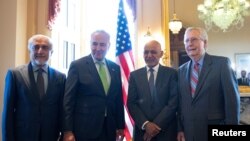Afghan President Ashraf Ghani has arrived in the United States ahead of a meeting with President Joe Biden at the White House on Friday.
A plane carrying the Afghan leader and his chief peacemaker, Abdullah Abdullah, landed early Thursday outside Washington.
The first face-to-face interaction between Biden and Afghan officials comes ahead of the withdrawal of the remaining U.S. and NATO forces from Afghanistan by September 11 in line with Biden’s direction to close what he has described as the “forever war.”
White House press secretary Jen Psaki said Sunday Biden “looks forward to welcoming” the Afghan leaders and will reassure them of U.S. diplomatic, economic and humanitarian support for the turmoil-hit country as the drawdown continues.
“The visit by President Ghani and Dr. Abdullah will highlight the enduring partnership between the United States and Afghanistan as the military drawdown continues,” she said.
Psaki emphasized that Washington “continues to fully support the ongoing peace process and encourages all Afghan parties to participate meaningfully in negotiations to bring an end to the conflict.”
Ghani's aide's said he will be discussion future ties between the two countries and continued assistance for Afghan security forces.
The foreign military drawdown, which formally started on May 1, has led to an unprecedented escalation in fighting between Afghan security forces and Taliban insurgents, dealing fresh blows to slow-moving U.S.-brokered peace negotiations between the Afghan adversaries.
The insurgents have in recent weeks captured dozens of new districts and both sides are said to have suffered heavy casualties, with Afghan civilians continuing to bear the brunt of the country’s long war.
The battlefield setbacks prompted Ghani on Saturday to replace his security chiefs, including the head of the national army, amid criticism a lack of coordination at the top level has been behind rising casualties among government forces and the Taliban advances.
The presidential move did not deter insurgents from overrunning new territory Sunday and inflicting more casualties on Afghan National Defense and Security Forces.
Tamim Asey, executive chairman of the Kabul-based Institute of War and Peace Studies, said Ghani’s visit to the White House would be a “critical morale and political boost” for the Afghan government.
“The visit announcement comes at a critical time when the Afghan political and military theaters feel abandoned by the United States,” Asey told VOA. “The agenda would be of course the new chapter of relations between the two countries and U.S. enduring support to the Afghan security forces and peace process.”
The U.S.-led military exit stems from the February 2020 agreement Washington signed with the Taliban in return for counterterrorism guarantees and pledges the group would negotiate a political settlement to the war with the Afghan government.
Psaki said that Washington will remain “deeply engaged” with the Afghan government “to ensure the country never again becomes a safe haven for terrorist groups” that pose a threat to the U.S.
The insurgents, however, have rejected domestic and international calls for easing their violent campaign and engaging with Afghan rivals in a productive dialogue, which is being hosted by Qatar where the U.S.-Taliban deal was also inked.
Asey said “poor leadership and bad management” in the Afghan security sector were to blame for recent Taliban battlefield gains. Moreover, he added, the withdrawal of years of crucial American intelligence cover and air support also exacerbated the challenges for Afghan National Defense and Security Forces.
“The hasty withdrawal of the American forces has had detrimental effects on the morale, resources and intelligence support infrastructure for ANDSF,” Asey said. “This shock has led to defections and desertions, but it is a temporary shock that will help the indigenization of war making and war waging in Afghanistan. The Afghans feel they are abandoned and left to the wolves.”





